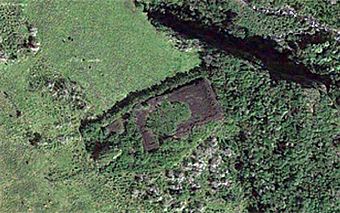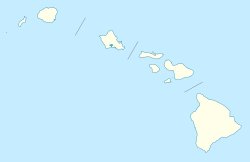Loʻaloʻa Heiau facts for kids
|
Loʻaloʻa Heiau
|
|

Undated aerial photo
|
|
| Nearest city | Kaupo, Hawaiʻi |
|---|---|
| Area | 1.4 acres (0.57 ha) |
| Built | 1730 |
| NRHP reference No. | 66000301 |
Quick facts for kids Significant dates |
|
| Added to NRHP | October 15, 1966 |
| Designated NHL | December 29, 1962 |
Loʻaloʻa Heiau is a very old and important temple located in Kaupo, on the island of Maui in Hawaiʻi. It is one of the few large heiau (Hawaiian temples) that are still mostly complete. This type of temple, called a luakini, was used for important ceremonies by the Hawaiian government.
People believe that King Kekaulike of Maui built this temple around 1730 AD. He lived in Kaupo and passed away in 1736. The temple was once the center of a big cultural area. Archaeologists studied the site in 1931. In 1962, it was recognized as a National Historic Landmark, which means it's a very special place in American history.
Contents
What Does Loʻaloʻa Heiau Look Like?
Loʻaloʻa Heiau is found in a quiet, country part of southeastern Maui. It's in the small town of Kaupo, on private land, a bit uphill from Hawaii Route 31. The heiau is a large platform made of stone, built on a small hill.
How Big is the Temple?
The temple platform is made of three levels. It measures about 115 feet wide and 500 feet long. However, one end of the platform is damaged. This makes it hard to know its exact original size without more archaeological work.
Parts of the Temple Platform
The eastern side of the platform is thought to be where the main ceremonies happened. This part has stone walls that are up to 20 feet high. The western part of the platform has been disturbed over time. It has almost no stone paving left, and trees are growing in holes there. There are also smaller structures around the edges of the main platform. It's possible that the whole site, including buildings for people who worked at the temple, was much larger.
Why is Loʻaloʻa Heiau Important?
Loʻaloʻa Heiau is a great example of a large, government-level temple from ancient Hawaiʻi. Its features and the stories passed down through generations show how Hawaiian religious practices changed over time. This happened before people from outside Hawaiʻi arrived.
Kaupo's History and the Temple
When Europeans first came to Hawaiʻi in the late 1700s, about 1,000 people lived in the Kaupo area. This area was an important center for both daily life and special ceremonies. Later, in the early 1800s, Kamehameha I united all the Hawaiian islands into one kingdom. After this, Kaupo became less important as a main center for government and ceremonies.
 | Percy Lavon Julian |
 | Katherine Johnson |
 | George Washington Carver |
 | Annie Easley |


